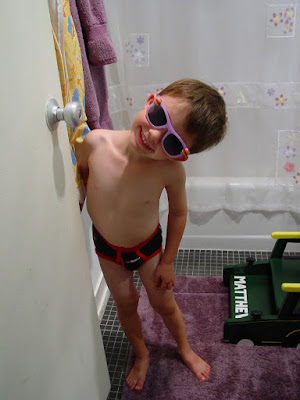Thursday, September 17, 2020
Tonight's picture was taken in September of 2006. Mattie was four years old. You maybe asking yourself, what was going on here? Well just like everything else involving Mattie, he needed to do things on his own time line. Potty training was one of those things. By age four, Mattie was in preschool, and he began noticing that his friends weren't wearing diapers or pull ups. Honestly the one time when peer pressure was actually a good thing. Mattie was inspired to learn to use the toilet and move away from pull ups. So this photo was taken after another successful potty run! Mattie had his tractor step stool (which he and Peter built from scratch and then painted it) in the process, and why not wear sunglasses for the occasion?!
Quote of the day: Today's coronavirus update from Johns Hopkins.
- number of people diagnosed with the virus: 6,664,021
- number of people who died from the virus: 197,447
Our day started with a video interview conducted by a researcher based at Children's Hospital of Philadelphia. We have met this researcher before and are very impressed with her understanding, expertise, and compassion for children with cancer and their families. This researcher and her team designed an evidence based psychosocial screening tool. In the process of their research, we have been interviewed about this tool, and apparently given our previous interview, we were invited back today. Today's interview was video taped, as what we were sharing is going to be integrated into a training webinar for clinicians.
It is one thing to design a screening tool to assess for risk and resiliency across multiple domains like family structure, sibling stress, social support, family problems, etc, and another to get buy in from clinicians to use these evidence based tools with families. Clinicians need to hear from family members and advocates within the community about the importance of screening. As Mattie Miracle is very passionate about evidence based tools that can help families and clinicians communicate with each other, educate one another, and build rapport and a therapeutic alliance. After all rapport and trust are crucial factors in our health care providers. Especially those we are sharing our children with, and our family structure and dynamics.
Given our experiences with Mattie, we can speak quite confidently about what was missing from Mattie's treatment and what needed to happen for us and therefore other families like ours. As I told the researcher today, it is possible she will get push back from clinicians in hospitals. They may say that using a screening tool is invasive for families, or better yet that no one has the time to administer such tools. I truly believe these barriers need to be confronted head on. Because if someone would have said to me on day one that childhood cancer is a medical and psychological disease, I would have paid attention. Instead, the only thing parents are bombarded with are the medical protocols. But that is short sided, because the medicine is actually a very small part of cancer treatment. It is the 24/7 issues, that arise from the medical treatment, that truly require support.
Therefore, I encouraged clinicians to think about the screening tool as the first opportunity they can use to connect with a family. To educate families about the psychological component of cancer treatment, and to begin building the relationship between themselves and families. In addition, the information one obtains from screening is vital. I know it would have helped Mattie, if we had an initial screening. Mattie had sensory integration issues prior to diagnosis. He did not like loud noise or people too close to him. Knowing this information would have changed the way IVs and MRI's were initially given to him. Instead, because no base line information was taken from us, these procedures landed up traumatizing Mattie. Once traumatized by a procedure, it is very hard to reverse the fear for a child. Especially when dealing with prolonged hospitalizations.
Needless to say, Peter and I both felt very good about today's interview. As we wore both our parent and Foundation hats. Any time we can speak about Mattie and share our experiences to help others, feels very empowering.
Later in the morning, we took Sunny to Roosevelt Island. It is our weekday retreat from this lock down reality.
The beauty of the Island.
I took this photo because the Island is very close to the city, and planes can fly overhead. But for the most part, it is an oasis from the city.
Sunny loves it! I can't tell you how many times we walked this boardwalk with Mattie. Or better yet, how many times we walked this boardwalk after Mattie died, looking for a way to stabilize and reconnect with the world around us. Back then, it felt like our bodies were moving, but our hearts and minds were somewhere else.
I found this tree with many burls on it. The funny thing about it is if you look at it closely, it almost seemed like many wooden faces looking back at me.









No comments:
Post a Comment